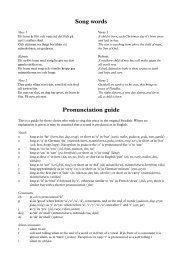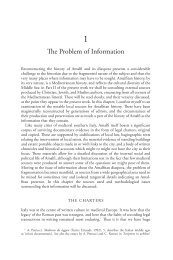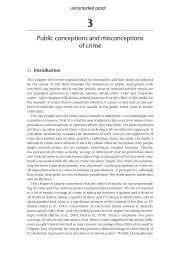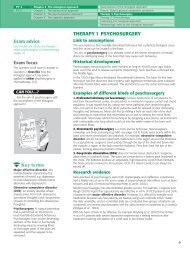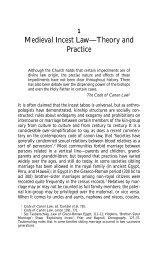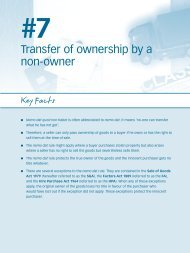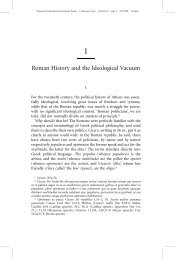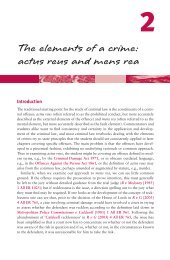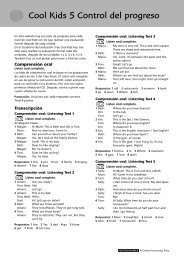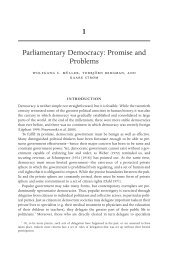Chapter 11 The Tort of Negligence - OED-update - Oxford University ...
Chapter 11 The Tort of Negligence - OED-update - Oxford University ...
Chapter 11 The Tort of Negligence - OED-update - Oxford University ...
You also want an ePaper? Increase the reach of your titles
YUMPU automatically turns print PDFs into web optimized ePapers that Google loves.
<strong>Chapter</strong> <strong>11</strong> <strong>The</strong> <strong>Tort</strong> <strong>of</strong> <strong>Negligence</strong> 357<br />
do so. In Smith v Eric Bush (1989) a negligent report, prepared by the defendant, had a<br />
disclaimer <strong>of</strong> liability but the court stated that the disclaimer was unreasonable, and,<br />
therefore, invalid under the Unfair Contract Terms Act 1977.<br />
Psychiatric injury (Nervous Shock)<br />
Psychiatric injury, which is sometimes referred to as ‘nervous shock’, is a form <strong>of</strong> personal<br />
injury but it is more problematical to claim for than physical injury. <strong>The</strong>re must be<br />
evidence that the claimant has suffered a serious psychiatric illness such as post-<br />
traumatic stress disorder. Ordinary grief, anxiety, or fright, without any physical injury,<br />
is not enough as it does not amount to a psychiatric illness. <strong>The</strong> courts have always been<br />
cautious in recognising a duty <strong>of</strong> care in relation to psychiatric injury, for a number<br />
<strong>of</strong> reasons. It is more difficult to diagnose psychiatric injury than physical injury and,<br />
therefore, is easier to make fake claims. It may open the floodgates <strong>of</strong> litigation with a<br />
rush <strong>of</strong> claims being made, and psychiatric injury may be difficult to quantify in terms<br />
<strong>of</strong> compensation.<br />
<strong>The</strong> problem only arises in claims for ‘pure’ psychiatric injuries. This means where the<br />
claimant suffers only psychiatric injuries and is not physically harmed. <strong>The</strong>re has never<br />
been a problem <strong>of</strong> establishing a duty <strong>of</strong> care where a claimant suffers psychiatric injuries<br />
as a result <strong>of</strong> a negligently inflicted physical injury. A claimant can even be compensated<br />
for emotional distress and anguish as a result <strong>of</strong> physical injury. <strong>The</strong> general principles <strong>of</strong><br />
negligence are used where a claimant suffers a psychiatric injury and physical harm.<br />
However, where a claimant suffers only psychiatric injuries, additional requirements<br />
have to be met for a successful claim. In cases <strong>of</strong> pure psychiatric injuries a distinction<br />
must be made between a primary victim who is involved in the incident, and a secondary<br />
victim who merely witnesses the incident or arrives shortly after it has happened. Stricter<br />
rules limit the defendant’s liability towards secondary victims. It would not be fair, just, or<br />
reasonable for the defendant to be responsible for all persons who only witness the<br />
defendant’s negligent actions or happen upon them shortly afterwards but are not directly<br />
involved in the actions.<br />
Primary victims<br />
A primary victim is a person who was under actual threat <strong>of</strong> bodily harm or reasonably<br />
believed themselves to be so, as a result <strong>of</strong> the negligent event. For example, Sanjay is<br />
involved in a car crash caused by Leon’s negligence. Although Sanjay suffers no physical<br />
harm in the car crash, he does subsequently develop a psychiatric illness as a result<br />
<strong>of</strong> his experience. Provided that Sanjay was under actual threat <strong>of</strong> bodily injury, or<br />
reasonably believed himself to be so, at the time <strong>of</strong> the crash, he will be considered a<br />
primary victim.




